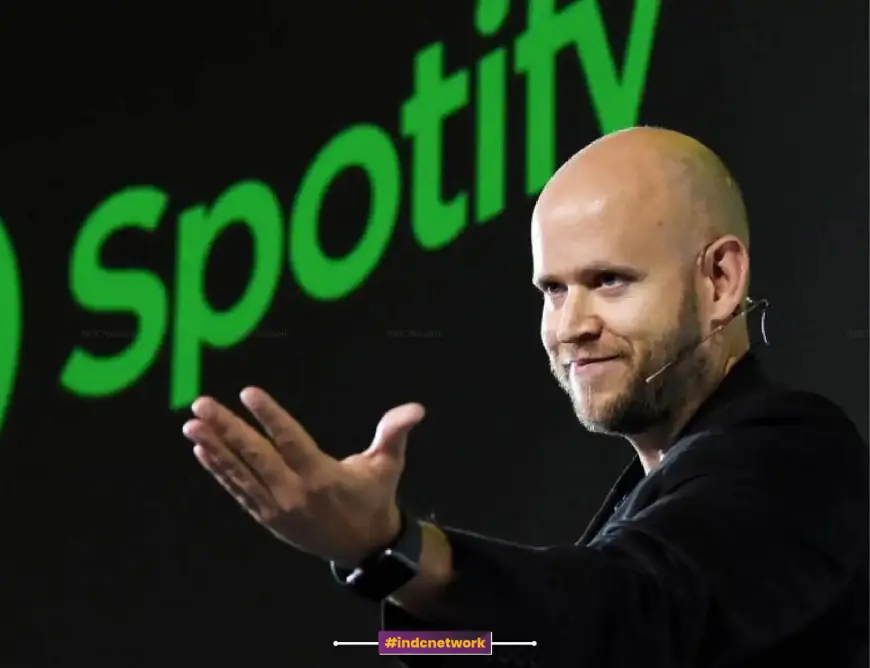How Daniel Ek's Vision Transformed Music Streaming: The Revolutionary Rise of Spotify
Daniel Ek, the co-founder and CEO of Spotify, reshaped the music industry by creating the world’s leading music streaming platform. From humble beginnings to disrupting the traditional music distribution model, Ek’s journey is a story of innovation, risk-taking, and an unwavering commitment to revolutionizing how people listen to music. This article dives deep into Daniel Ek's life, his vision for Spotify, and how the platform evolved from a small startup to a global music powerhouse, while also overcoming the challenges and competition that came its way.

INDC Network : Biography : Daniel Ek: The Visionary Who Changed the Future of Music with Spotify
Daniel Ek is one of the most influential figures in the tech and entertainment industries today, thanks to his pivotal role in founding Spotify, the world’s most popular music streaming platform. As the co-founder and CEO of Spotify, Ek not only disrupted the music industry but also transformed how we consume music in the digital age. His vision of providing unlimited access to music in a user-friendly way has revolutionized the way people listen to their favorite tracks, reshaping an entire industry along the way.
From Spotify's inception in 2006 to its current position as a global leader in music streaming, Daniel Ek’s journey has been marked by challenges, innovation, and perseverance. This article delves into Daniel Ek’s early life, the birth of Spotify, its growth, challenges, and successes, as well as his leadership style that has made Spotify a household name in the music world.
Early Life and Career: The Foundations of a Music Industry Giant
Daniel Ek was born on February 21, 1983, in Stockholm, Sweden. Raised in a middle-class family, Ek was an ambitious and curious child, interested in technology and the world of computers from a young age. His interest in tech blossomed when he started learning programming at just 13 years old, a skill that would shape his future career.
After completing high school, Ek went on to study at the Royal Institute of Technology in Stockholm. Although his passion for technology was clear, he dropped out of university at the age of 16 to pursue opportunities in the tech industry. By this time, Ek had already started developing websites and had a few tech jobs under his belt, working with Swedish web development companies. His early career laid the foundation for the entrepreneurial spirit that would later drive his success.
In his 20s, Ek worked for several prominent companies, including a stint at the Swedish digital advertising company Tradedoubler, where he served as Chief Technology Officer. His role at Tradedoubler provided him with the experience of growing a tech business, and the exposure to the digital world led him to understand the evolving landscape of online entertainment and digital media.
It was during this time that Ek became aware of the challenges facing the music industry. The rise of illegal file-sharing platforms like Napster, Kazaa, and LimeWire had created a massive shift in how people accessed music. The traditional music distribution models were failing, and the industry was in turmoil. Daniel Ek saw an opportunity to solve these problems by providing a legal, user-friendly platform that offered consumers access to music without the hassle of piracy.
The Birth of Spotify: A Solution to the Music Industry’s Crisis
In 2006, Daniel Ek teamed up with his former colleague Martin Lorentzon to launch Spotify. Their mission was simple: to create a platform that would give users access to music legally and conveniently, while compensating artists fairly. They wanted to provide a solution to the growing problem of music piracy and the decline of physical music sales by offering a streaming service that was both affordable and easy to use.
Ek and Lorentzon started Spotify in Sweden, a country with a strong tech scene and a significant interest in digital music. The pair initially faced numerous challenges in securing licensing agreements with record labels, who were hesitant to embrace the new model of streaming music. Many in the music industry were still recovering from the effects of piracy, and convincing them to partner with a new digital platform was no easy task. However, Ek’s vision for a legal streaming service and his persistence in negotiating licensing deals eventually won over the record labels.
In 2008, Spotify officially launched, offering a free, ad-supported model for users, with the option for premium subscriptions that allowed for ad-free listening and offline access to music. Spotify’s user interface was sleek, intuitive, and easy to navigate—qualities that helped attract users quickly. Unlike illegal file-sharing platforms, Spotify provided a legal, convenient alternative that allowed music lovers to stream their favorite songs on-demand.
One of Spotify’s most groundbreaking features was its ability to offer a vast catalog of music, thanks to its partnerships with record labels and independent artists. This approach gave Spotify an edge over other services, as users could enjoy millions of tracks without worrying about availability. By offering both a free and premium version, Spotify quickly gained a massive user base and became a direct competitor to other music services like iTunes and the struggling subscription-based services at the time.
The Growth of Spotify: Expanding the Streaming Revolution
Spotify’s growth was swift. After its launch, the platform expanded rapidly, first in Europe and later to other parts of the world. By 2011, Spotify had reached the United States, marking a major milestone in its expansion. While initially criticized for its limited catalog and the challenge of competing with more established services, Spotify’s constant innovation in both its technology and its business model helped it stay ahead of competitors.
Daniel Ek's leadership was instrumental in Spotify’s rapid rise. His approach to building the business was focused on user experience, with Spotify’s personalized music recommendations, playlists, and curated content becoming a key selling point. The company was also known for its strong engineering culture, constantly improving the app's functionality, user interface, and features.
Spotify’s freemium model was another key factor in its success. While the free version attracted a large user base, the premium version—offering better features like offline listening and no ads—converted many users into paying subscribers. This freemium approach allowed Spotify to monetize its platform effectively while continuing to grow its user base.
The company's growth was also fueled by aggressive marketing strategies and its ability to attract a diverse range of music genres and artists. Spotify’s playlists, including popular curated lists like Discover Weekly and Release Radar, became a defining feature that helped users discover new music. These algorithms, powered by machine learning, became some of the most sophisticated in the industry, providing highly personalized recommendations that kept users engaged.
Spotify's global expansion continued throughout the 2010s, reaching over 70 countries by 2018. By this time, the company had over 200 million active users and millions of paying subscribers, making it the dominant music streaming platform in the world.
Spotify’s Challenges and the Competitive Landscape
Despite Spotify’s success, the company faced several challenges over the years. One of the biggest hurdles was the constant pressure to balance the interests of artists, record labels, and users. While Spotify provided a platform for millions of artists, many of them criticized the company for not paying enough in royalties. Although Spotify paid significant amounts to record labels, artists often complained about the amount they received per stream, leading to ongoing debates about fair compensation.
Another challenge Spotify faced was increasing competition from other music streaming services. Apple Music, Amazon Music, and Google Play Music entered the market, offering similar services and vying for market share. Each competitor had its own unique features, and while Spotify maintained its leadership position, it had to constantly innovate to stay ahead of these new players.
Additionally, Spotify faced challenges in generating consistent profits. While the platform had millions of paying subscribers, its reliance on licensing deals and the high costs associated with streaming music led to consistent losses. To address these issues, Ek focused on diversifying Spotify’s business model by launching podcasting services, which offered new ways to monetize content beyond music.
Spotify’s push into the podcasting world, through acquisitions of companies like Anchor and Gimlet Media, marked a new era for the company. By embracing podcasts, Spotify expanded its offerings and attracted a broader audience, further diversifying its revenue streams and positioning itself as a leader in the audio streaming market.
Daniel Ek’s Leadership: A Visionary with a Long-Term Focus
Daniel Ek’s leadership has been a key factor in Spotify’s success. His ability to anticipate industry trends, make bold decisions, and maintain a long-term vision for Spotify has allowed the company to thrive in a competitive and ever-changing market. Ek is known for his focus on product innovation, his strategic thinking, and his ability to remain patient in the face of setbacks.
Ek's leadership style is often described as data-driven and analytical. He is deeply involved in Spotify’s product development and is known for fostering a culture of experimentation. This focus on constant innovation has allowed Spotify to stay ahead of its competitors and continue to grow its user base.
Furthermore, Ek has positioned Spotify as a platform that champions the creative freedom of artists. Despite the criticisms over royalties, Spotify has consistently worked to provide a space for creators to share their music with a global audience. Under Ek’s leadership, Spotify has also championed initiatives like “Spotify for Artists,” which gives artists tools to manage their music, connect with their audience, and make a living from streaming.
Conclusion: The Future of Spotify and Daniel Ek’s Legacy
Daniel Ek’s journey from a tech entrepreneur to the CEO of one of the world’s most popular streaming platforms is a testament to his visionary leadership and determination. Spotify’s success has not only reshaped the music industry but has also set the standard for how digital content is consumed in the modern era.
As Spotify continues to grow, expand its offerings, and face new challenges, Daniel Ek’s long-term vision and commitment to innovation will be essential in navigating the evolving landscape of digital media. Spotify’s push into podcasts, its focus on personalized user experiences, and its efforts to support artists will shape its future and ensure that the company remains at the forefront of the music and audio streaming industries for years to come.
Daniel Ek's legacy as the man who revolutionized music streaming is firmly secured. Spotify’s influence on how we consume music, discover new content, and engage with artists will continue to resonate in the decades ahead.
What's Your Reaction?













































































































































































